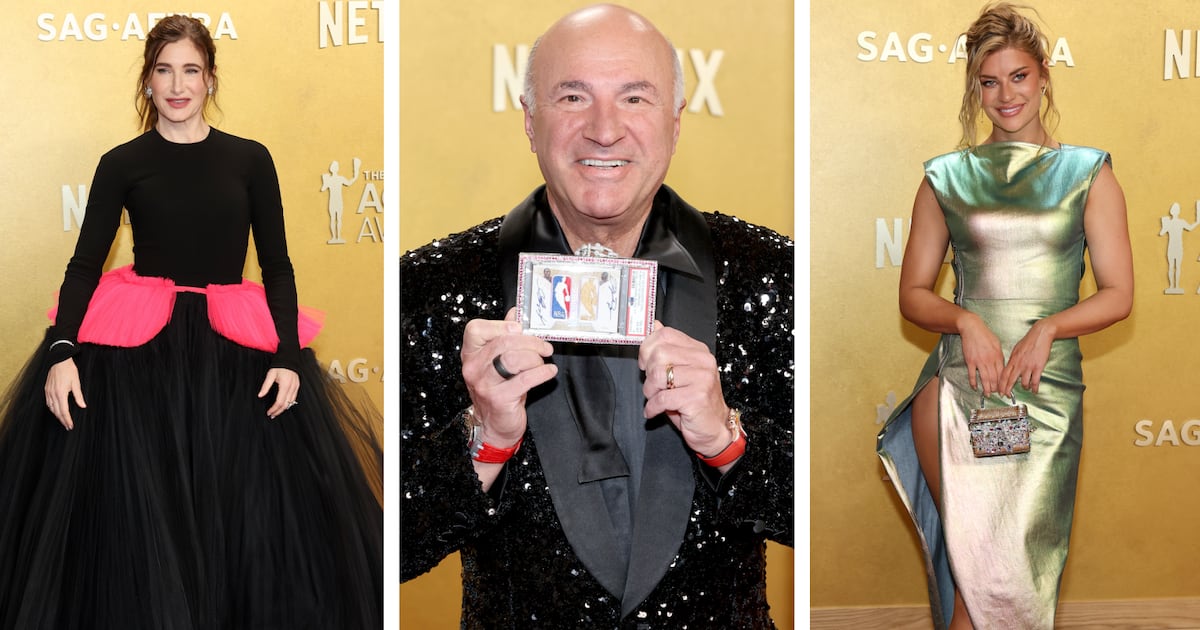Sam Smith has taken over the world. Their big single “Unholy,” featuring Kim Petras, is currently second on the Billboard Global 200 chart. It has been on the chart for a remarkable 16 weeks, and No. 1 for several of them, with no signs of slowing down. It’s a historic accomplishment: Sam Smith is non-binary, and Kim Petras is a trans woman. How many other songs led by trans and non-binary artists have topped the charts? The answer is none, as “Unholy” is the first.
It’s a bold new beginning for Smith in several ways. For one, they’ve been wearing things—often traditionally female-coded clothes—that they wouldn’t have dreamed of putting on when their career began and carrying themselves with heartwarming confidence. Their first album, 2014’s In the Lonely Hour, feels practically sexless compared to their new music.
Smith recently told The Independent that they’ve got “the opposite of body dysmorphia.” They look like they’re the most comfortable they’ve ever been, and in a world where people get scrutinized for simply existing, it feels like a spectacular accomplishment. Smith seems truly alive and thriving in their new musical direction, and I’m living for it.
With Smith’s latest album Gloria now available, Smith is poised to cement his status as one of the world’s most popular artists. It’s taken a long time for Smith to get to this glorious, liberated space, and they’ve dealt with an absurd amount of backlash along the way. But Sam Smith’s transformation is one worth celebrating—and for those who’ve followed them, it’s something they’ve been building towards their entire career.
In 2014, I had just moved back to the U.K. to get yet another degree, and I was going through a spectacularly slow-burning break-up. Sam Smith's “Stay With Me” was dominating air-play, and it really spoke to me. Their voice blew me away, and the song had that balance between stoic and whiny that reflected my own psyche to a tee.
I saw Sam Smith perform at the end of 2014, and was awe-struck by the power and range of their voice. I can’t help but sing along at concerts (if you don’t, why would you even go?) and it’s fair to say I sounded absolutely heinous trying to replicate his tone. I had a great time, but there was something that lingered with me long after the concert: how could someone with such a powerful voice come across as so shy and reserved?

Sam Smith onstage with Disclosure at the 2016 Coachella Valley Music & Arts Festival at the Empire Polo Club, Indio, California, April 16, 2016.
Kevin Mazur/Getty Images for CoachellaA few years later, I had my answer. In 2017 Sam Smith came out as genderqueer. Coming out is really hard, even if you have a solid support base. It requires a tremendous amount of vulnerability to open up about your truest, deepest self. But Smith had to do it twice! Immediately that sense of reservation made sense, and I knew the feeling intimately—that queasy feeling that if you act too confident and too openly, you’ll be found out, exposed.
Gender is, and always has been, complicated. Sure, for many you simply fit in a preconceived box and stay there without a care in the world. But for many people like Sam Smith, it takes a really long time to figure out where you fit in. So much so, that Smith came out a third time in 2019 as non-binary, and adopted they/them pronouns. The bravery it takes to come out once is Herculean, but coming out three different times, in the extremely public eye? Hercules could never.
It’s certainly not been an easy road for the artist, and controversy seems to follow Smith around. Sometimes they’ve made genuine mistakes: Back in 2015, they claimed to be the first openly gay man to win an Oscar (for their Spectre theme song). That’s not true, and Smith has since apologized several times, but people continued to rake them over the coals for an honest mistake. There was also a separate incident where Smith said they didn’t know who Radiohead frontman Thom Yorke was. It led to a long-running “feud” between the two, mostly on Yorke’s part, offended that someone would dare not to know his name.
I can’t believe I have to say it, but I simply cannot fathom the same level of controversy if Smith were heterosexual. Instead, since their career picked up steam with Disclosure’s hit “Latch” in 2012, they’ve received a plethora of hate for little reason. Living with a target on your back for no reason must be exhausting.
Take the most recent incident: In December, Smith posted photos of themself on Instagram, living it up on a boat, sporting a skimpy leopard-print bathing suit. I’ve rarely seen someone look so happy, gorgeous, and at home with themselves online.
But because social media is often horrific, it should come as no surprise that the comments were full of overwhelming nastiness and vomiting emojis. Smith also isn’t skinny, and the combination of being non-binary and having body fat seems to be too much for some of the peanut gallery to process. That’s an alarming trend with a lot of Smith’s social media content: people lamenting the “loss” of the Sam Smith of yesteryear, frequently expressing their disgust with the artist’s new persona every time they put on a fun outfit or reveal bare skin.
But it’s not a new persona: It’s who Sam Smith is, and they’re finally living openly and honestly. Every time I see Smith, I beam with joy at a queer person fully embracing themselves. That’s always hard to do, but when trans and non-binary rights are constantly under attack (particularly in the U.S. and the U.K.), it’s especially powerful.
Smith’s transformation has been steadily building through their music. Their breakthrough solo hit “Stay With Me” has Smith yearning for a love they cannot find; “Too Good at Goodbyes,” released three years later, has a heavy air of resignation, as Smith fears they will never find the love they seek. You can’t shake the feeling in Smith’s work that there’s a deep sense of discomfort below the thoughtful lyrics and striking melodies, especially in these older songs.

Sam Smith performs during 102.7 KIIS FM’s Jingle Ball 2019 Presented by Capital One at the Forum on Dec. 6, 2019, in Los Angeles, California.
Rich Fury/Rich Fury/Getty Images for iHeartMediaSmith’s 2020 album Love Goes—their first since coming out as genderqueer in 2017—marked a significant shift. The album opens with the gorgeous “Young,” where they lament, “I want to be wild and young, and not be afraid to lose.” They go on to reveal that “all I wanna do is get a little wild, get a little high. Kiss a hundred boys and not feel like I’m tied to them.” That’s a huge change from the person who opened their first single with “I’m no good at a one-night stand.”
It makes sense that, since coming out, Smith’s music has gotten sexier and bolder—just like Sam themself. The trend is thankfully continuing into their latest album cycle: In 2022, Smith released “Love Me More,” the lead track on their new album Gloria. It’s their most uplifting song, an upbeat celebration of Smith chasing their demons away and learning to love their authentic self. “Every day I’m trying’ not to hate myself,” the song opens. “But lately, it’s not hurtin’ like it did before. Maybe I am learning how to love me more.”
I’m continually taken aback by how far Smith has come: from someone whose music once felt like a resignation to a sorry state of self to a self-assured, honest art. What a win for queer people everywhere it is when one of us loves ourselves unapologetically.
If you need concrete evidence that Sam Smith has truly transformed, look no further than their recent musical guest appearance on Saturday Night Live. Smith performed two songs: “Unholy” and the title track on their latest album, “Gloria.” The performances were, it thrills me to say, absolutely bonkers, a total pleasure to watch.
During “Unholy,” Smith appeared what my fashion-addled brain can only describe as a monstrous pink loofah mixed with Big Bird. And no, that’s not an insult. It was enormous, to the point where you could barely even see Sam’s head poking out of it. But Sam had so much confidence on stage that it didn’t matter if it was all a bit chaotic. Smith owned the moment and looked like they were having the time of their life performing the most popular track of their career. If that wasn’t enough, there was even a super-cute reveal to punctuate the number: Kim Petras appeared from underneath the loofah monster to crush her verse on the song.
Then there was “Gloria.” If you thought “Unholy” was wild, just wait, because this number was deliciously wacky. Smith is clearly no diva, refusing to take centerstage here; instead, they were at the very back, flanked by a couple dozen choir singers. But in the middle of the stage, lying down on a plinth was… Sharon Stone. Yes, that Sharon Stone. What is Stone’s connection to Smith? She was in a movie called Gloria once. But otherwise: Does it matter? Because while this hauntingly beautiful celebration of someone named Gloria was going on, all the focus was on Stone, who just lay there. As the song went on, she got up slightly and looked stunningly devastated. I didn’t know what was going on, you didn’t know what was going on, but what we can all agree on is that these performances will one day replace the dictionary definition of camp.
A tenet of queer culture is to go against the grain and offer something different and unexpected, and that’s exactly what Smith delivered tenfold in their SNL performances.
It’s no coincidence that Smith’s musical rise to the top has come alongside their personal revelations. Sam Smith knows who they are, and that’s become a part of everything they do. The outfits are thrilling, the music is more fun than it’s ever been, and Smith has truly learned to love themself. All their haters should take a lesson from their glorious, fluffy, absurdist book.







